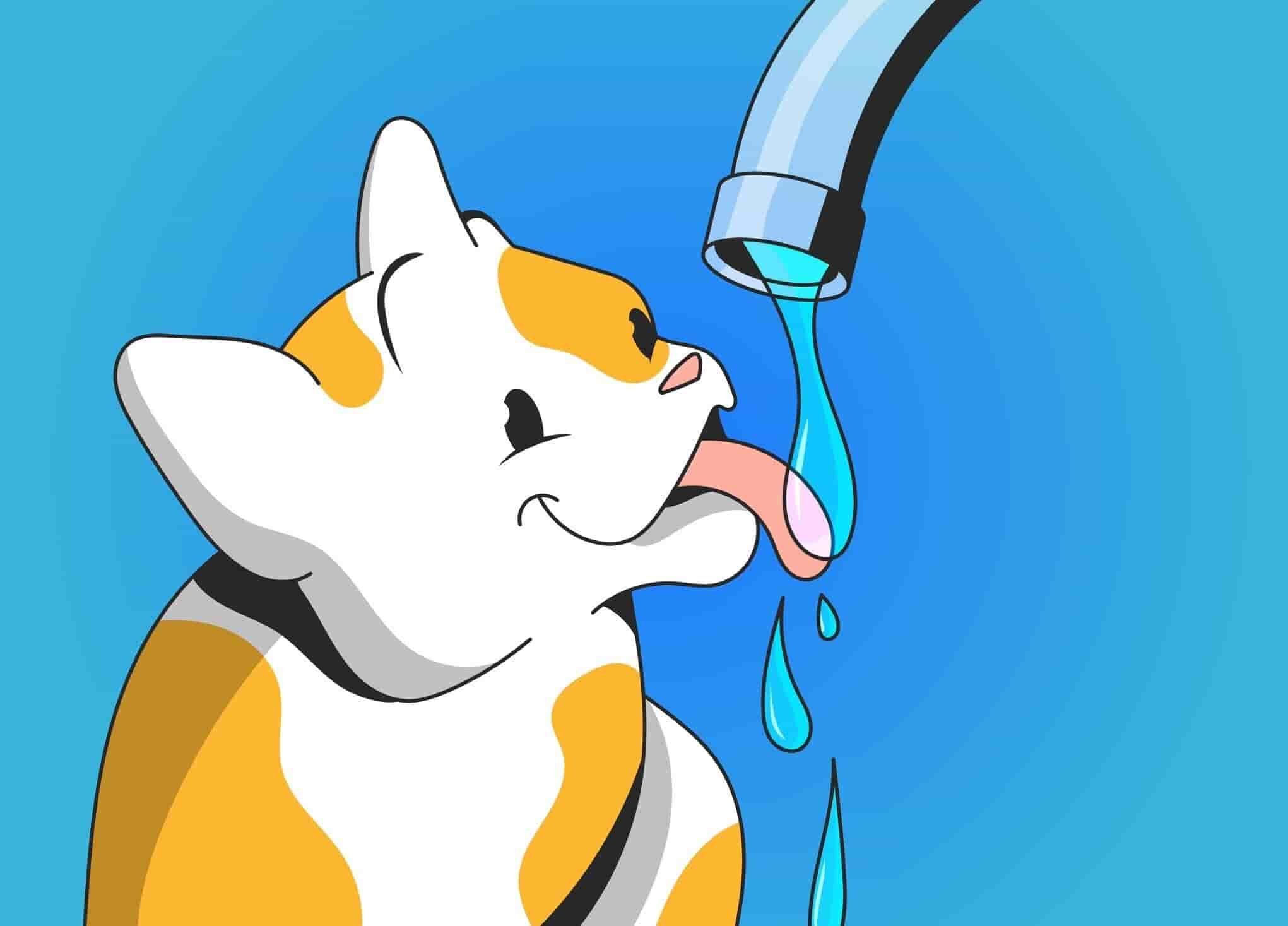There are many factors that may affect the amount of water that your cat drinks. For example, the amount of water that a cat drinks may depend on their diet. For example, those who are fed a wet diet usually get a huge percentage of their hydration from their food, just like cats in the wild.
Meanwhile, cats that mostly eat dry food need to drink more water in comparison. Apart from this, there are other possible underlying causes as to why a cat drinks too much water. But how do you know if a cat is drinking too much? If your cat is drinking a lot of water, should you be worried?
This article was reviewed by our expert veterinarian, Chris Vanderhoof (DMV).
How Much Should Cats Drink?
When your cat drinks a lot of water and you’re worried that it might be too much, it would help to keep track of their water intake within a day. Normally, a cat shouldn’t drink more than 100 ml per kg of their weight in a span of 24 hours. If a cat’s water intake exceeds 100 ml in a day, this is called polydipsia, or excessive water intake in cats.
What you can do is measure their intake of water for 24 hours by providing water bowls with enough clean water, and measuring what is left after 24 hours. Note, however, that it may be hard to measure this if you have a multi-cat household where they share water bowls.
Also, even if your cat doesn’t exceed the water intake of 100 ml per kg of weight in 24 hours, you should have them checked with a vet if you notice an increase in their water intake which is more than usual. It would be beneficial as well if you relay to your vet how much water your cat drinks if ever you have measured it.
Read more: How Much Water Does Your Pet Need?
Causes of Cat Excessive Thirst
If you’ve noticed that your cat drinks a lot of water (more than usual), you might be wondering: “Why does my cat drink so much water?” Among the most common causes of an increase in a cat’s water intake include:
1. Feline lower urinary tract disease (FLUTD)
A term that is used to classify conditions affecting a cat’s urethra and/or urinary bladder, FLUTD or feline lower urinary tract disease is said to affect about 1-3 % of felines every year.
2. Chronic kidney disease (CKD)
Chronic kidney disease (CKD) pertains to cats that have kidney failure. This condition is one of the most common conditions in senior cats. It is progressive, and its decline rate varies in every cat.
3. Diabetes
According to research, diabetes is among the most common hormonal conditions in cats. Once diagnosed, it can be successfully managed, but treatment should be specific to the cat.
4. Hyperthyroidism
A condition that causes either one or both of a cat’s thyroid glands to become hyper and enlarged, 97-99% of Hyperthyroidism cases are benign while 1-3% of cases are cancerous.
5. Liver disease
There is a wide range of liver diseases that cats can suffer from, and treatment is important if ever they do suffer from it. As a vital organ, the liver has a lot of functions to maintain health. If your vet suspects that your cat may have liver disease, a liver biopsy is likely to be recommended to determine the underlying cause.
Note from Dr. Vanderhoof: Many vets prefer to collect sterile urine samples at the office, since collecting samples from the box at home may have bacteria or other contaminants.
What To Do
If you notice your cat drinking and peeing more than usual, take them to the vet to determine the underlying cause and possible treatment options. Meanwhile, here are some things that you can do to help your vet in the diagnosis of your cat:
Measure your cat’s water intake
Like what was mentioned above, it would help to measure your cat’s water intake over a 24-hour period.
Collect a urine sample from your cat
When it comes to how to collect a urine sample from your cat, below are some guidelines.
What you would be needing:
- A special non-absorbable cat litter;
- Washed and clean cat litter box;
- Dropper and urine pot (if your cat litter doesn’t come with it).
Steps and tips:
- After your cat uses the litter box, you can now collect the sample;
- Ready your dropper and pot;
- Loosen your pot’s lid and use the dropper to collect a small amount of urine;
- Gently tip the litter box to make it easier to collect the urine;
- Transfer the urine from the dropper to the pot then close the lid tight;
- It’s okay if the amount of urine is just a little as your vet can run tests on it;
- On the sample tube, write your pet’s details including their name, the time as well as the date of collection.
Online Vet & Emergency Fund
There are several possible reasons why your cat may be drinking a lot of water. With this, it would help if you have easy access to licensed veterinarians so that you can consult with them about your cat’s condition whenever you feel like asking something.
A great option is Petcube’s Online Vet service which features a 24/7 online chat that allows you to consult with a team of licensed veterinarians anytime and anywhere. Think of the service as a friend that you can talk to about anything regarding your pet.
Whether it’s in the wee hours or during the day, you can depend on Online Vet to provide you with quality veterinary services.
Another great service by Petcube is the Pet Emergency Fund which gives you coverage of $3000 for ALL your pets at a fraction of the cost. We’ll never know when our pet may be in need of medical help, and with Pet Emergency Fund, we have the assurance of funds to treat whatever condition.
FAQ
Can a cat drink too much water?
If your cat drinks more than 100ml per kg of weight in a day or if your cat is drinking more than usual, you should take them to the vet to determine the underlying cause.
Why is my kitten drinking a lot of water?
A reason for this may be due to their diet. If a kitten is fed with dry food they are more likely to be thirsty. If so, adding more wet food to your kitten’s diet may help. Also, since kittens are very active you may find that they drink more after a play session which is just normal.
However, if you are worried and if your kitten has a sudden increase in water intake, it is recommended to bring them to the vet to determine the possible cause.
Why is my cat drinking a lot of water and losing weight?
If your cat is drinking a lot of water and losing weight at the same time, it may be a sign of a disease that should be addressed as soon as possible.
As an example, cats may not look ill until 75% of their kidney function is already lost. Because of this, it is important to watch out for early signs of disease to prevent complications.

Was this article helpful?
Help us make our articles even better









